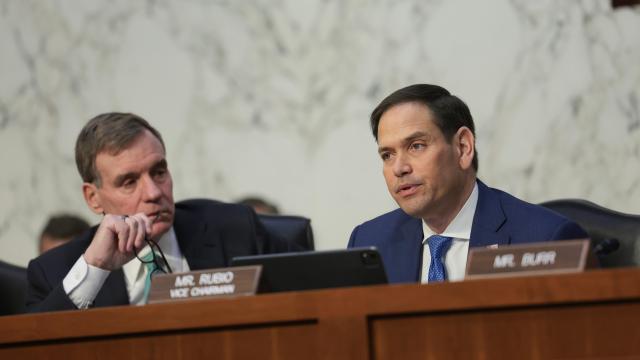Pressure’s mounting to throw TikTok back into the regulatory spotlight, this time from a bipartisan pair of U.S. senators on the Senate Intelligence Committee.
On Tuesday, the committee’s Democratic Chairman Mark Warner, and Republican Vice Chairman Senator Marco Rubio called on the Federal Trade Commission to investigate the app over recent reports alleging China-based workers were granted access to U.S. user data. The Senators’ demands come amid growing pushback from a cohort of mostly Republican lawmakers and just one week after a commissioner at the Federal Communications Commission wrote a scathing letter calling on Apple and Google to 86 the app from their App Stores.
In their letter addressed to FTC Chair Lina Khan, the lawmakers cited leaked TikTok audio from a recent BuzzFeed News report that allegedly includes 14 statements from nine employees who admit engineers had access to U.S. user data for five months between September 2021 and January 2022. That revelation allegedly flies in the face of previous data security assurances provided by TikTok executives. According to the senators, TikTok’s “apparent deception” warrants the immediate opening of an FTC probe.
“We ask that your agency immediately initiate a Section 5 investigation on the basis of apparent deception by TikTok, and coordinate this work with any national security or counter-intelligence investigation that may be initiated by the U.S. Department of Justice,” the senators wrote in their letter.
“For years, TikTok has assured lawmakers that user data — and business operations — were effectively firewalled from the People’s Republic of China,” Warner said in a statement. “I’m working with [Marco Rubio] in light of reports neither claim is true.”
For years, TikTok has assured lawmakers that user data – and business operations – were effectively firewalled from the People’s Republic of China. I’m working with @MarcoRubio in light of reports neither claim is true.
— Mark Warner (@MarkWarner) July 5, 2022
According to the recordings obtained by BuzzFeed, at least eight different TikTok employees said they weren’t granted permission to access data on their own and described situations where they had to turn to their China-based colleagues for approval.
“TikTok’s Trust and Safety department was aware of these improper access practices and governance irregularities, which — according to internal recordings of TikTok deliberations — offered PRC-based employees unfettered access to user information, including birthdates, phone numbers, and device identification information,” the senators added.
The FTC did not immediately respond to Gizmodo’s request for comment.
Warner and Rubio went on to cite a pair of recently passed Chinese national security laws which they claim, “provide extensive and extra-judicial access opportunities,” that could, in effect, make TikTok’s efforts to host U.S. user data on U.S. servers a moot point. “Under these authorities, the CCP may compel access, regardless of where data is ultimately stored,” the senators wrote.
It’s starting to feel like 2019 all over again
Warner’s addition to the TikTok criticism fire adds a sprinkling of bipartisanship to mounting security concerns so far overwhelmingly voiced by lawmakers from the right side of the political aisle. Those concerns were made official last week when Tennessee Republican Senator Marsha Blackburn and eight of her fellow conservative lawmakers sent an open letter to TikTok CEO Shou Zi Chew expressing concerns TikTok officials misrepresented themselves publicly and under oath in front of the Senate Commerce Committee.
“The implications of these findings are stark, but not surprising,” the Republican lawmakers wrote. “Rather, they simply confirm what lawmakers long suspected about TikTok and its parent company, ByteDance — they are using their access to a treasure trove of U.S. consumer data to surveil Americans.”
A TikTok spokesperson defended the company’s data security efforts in a statement sent to Gizmodo.
“For two years, we’ve talked openly about our work to limit access to user data across regions, and in our letter to senators last week we were clear about our progress in limiting access even further through our work with Oracle,” the spokesperson said. “As we’ve said repeatedly, TikTok has never shared U.S. user data with the Chinese government, nor would we if asked.”
Chew himself wrote a lengthy response letter to the Republican lawmakers in an attempt to assuage their concerns. In his letter, Chew tried to pour water over the much-cited BuzzFeed article which he claims contains, “allegations and insinuations that are incorrect and are not supported by facts.” Despite those denials, Chew himself confirmed in his letter that China-based employees can indeed have access to U.S. user data under certain scenarios.
If all of this feels familiar, it’s because we’ve largely been here before. Back in 2019 then-president Donald Trump, allegedly flummoxed by Chinese surveillance claims, signed an executive order threatening to ban the app unless ByteDance sold the U.S segment of its business to an American firm. That order took a number of left turns but eventually ended with Oracle becoming a “trusted technology partner,” to TikTok. The company just last month claimed it has officially completed its migration of U.S. user’s data to Oracle servers, but recent reports cast doubt on the validity of significance of those claims.
Just like the last round of TikTok alarmism though, it’s hard to see how this recent sputtering of concerns will result in anything radically altering the way Americans interact with TikTok. Simply put, the app’s just gotten too damn big. Recent forecasts from eMarketer show user time spent on TikTok has already shot past Facebook, Instagram, and YouTube. TikTok was also reportedly the top downloaded app in the U.S. And, I mean, hell, TikTok got more traffic last year than Google!
So, continued lawmaker pushback or not, it doesn’t look like TikTok’s going anywhere.
You can read Warner and Rubio’s letter in its entirety here.
